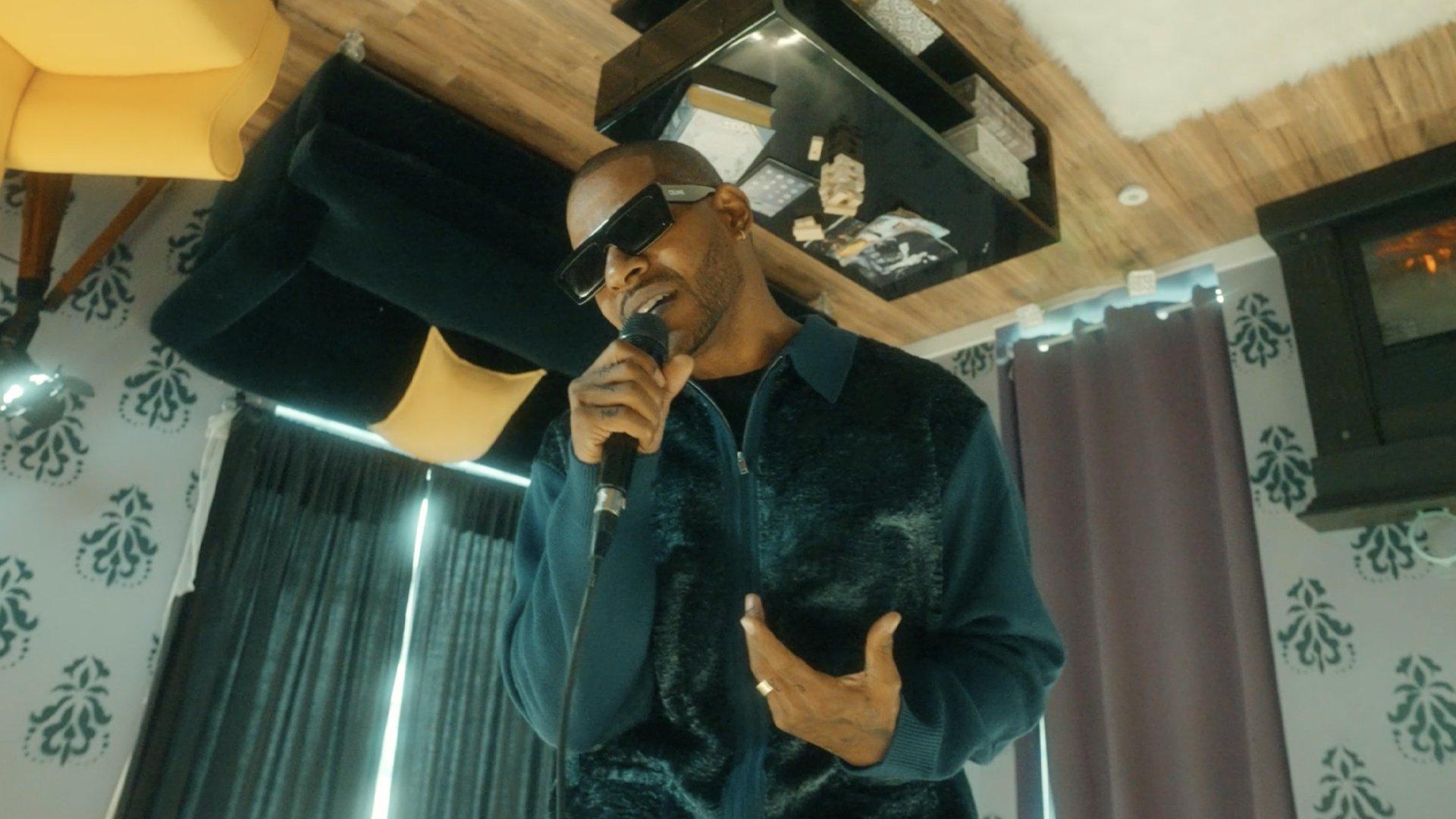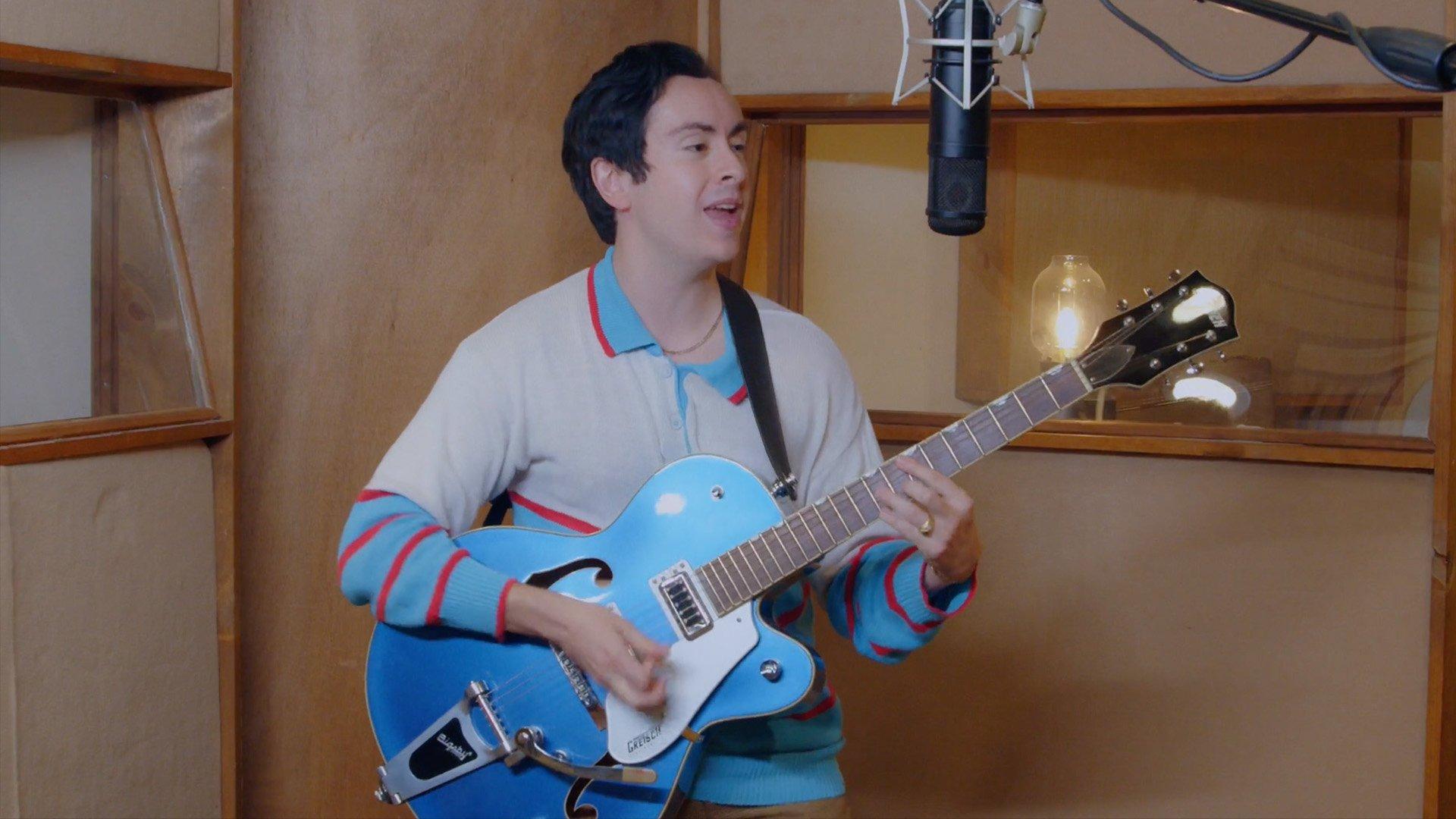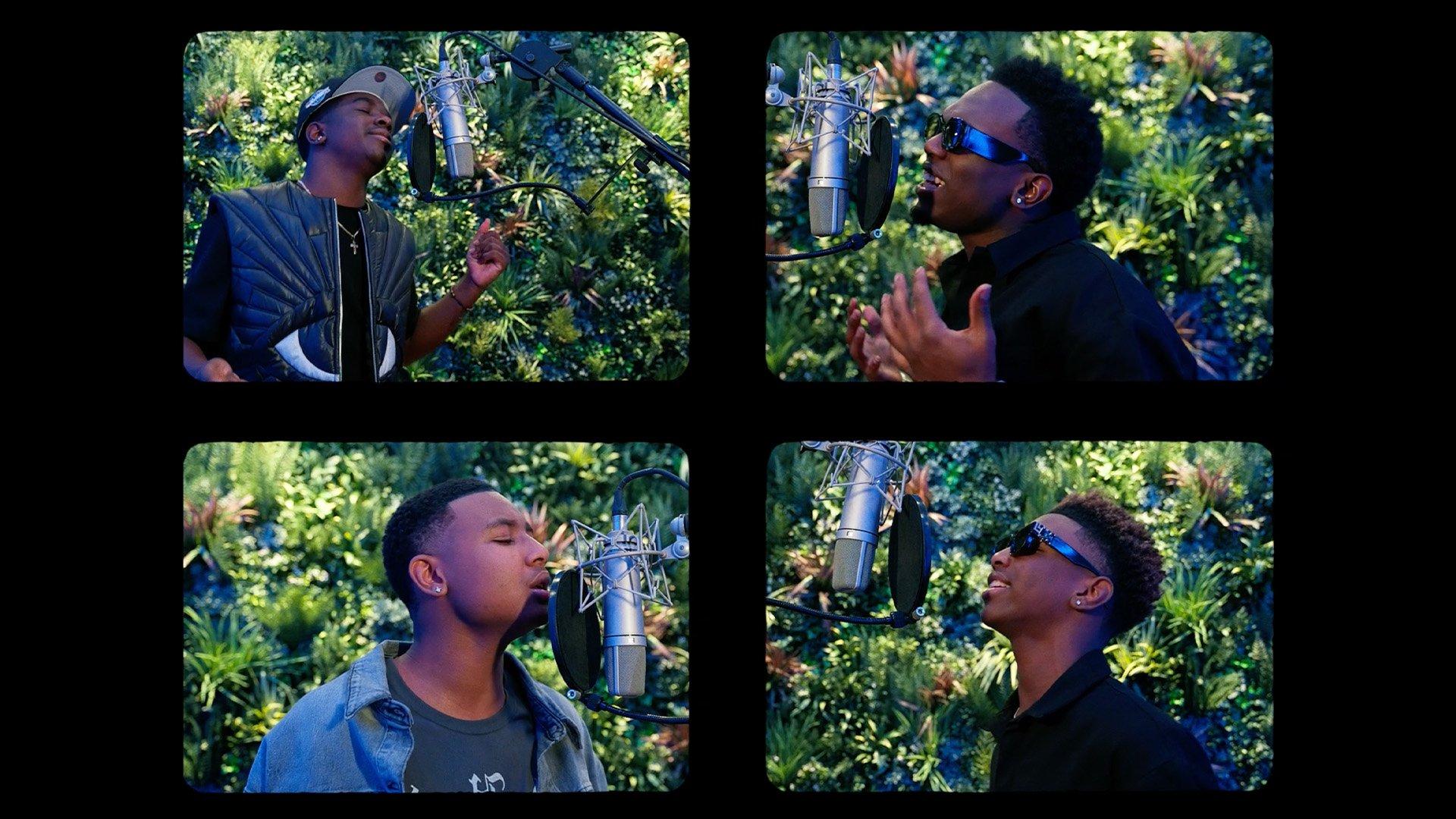Photo: Courtesy of Eric Bellinger

video
ReImagined: Eric Bellinger Defies "Gravity" With A Silky Rendition Of John Mayer's Hit Single
R&B singer Eric Bellinger reconstructs John Mayer's hit single "Gravity" into a soothing R&B track — and delivers a mind-bending performance that brings the song's title to life.
It's no secret that the blues have heavily influenced John Mayer's discography. The guitarist's venture into the genre traces back to his GRAMMY-winning 2006 studio album, Continuum, especially on the track "Gravity" — and now, Eric Bellinger is giving the bluesy single an R&B twist.
In this episode of ReImagined, the singer/songwriter transforms the Continuum single into a warm, velvety R&B track. Bellinger constructs the arrangement on his own, pairing his sultry vocals with a cajón drum box, keyboard and bass guitar.
Adding an eye-catching appeal to the performance, Bellinger adds a literal interpretation of the track's lyrics — "Gravity is working against me" — as he paces around the ceiling of an upside-down house.
Outside of his original music, Bellinger has had a prolific career posting covers on YouTube, including his popular re-envisionings of Drake's "Fake Love" and Rae Sremmurd's "Black Beatles." The R&B singer also has an impressive list of songwriting credits, including his work on Chris Brown's F.A.M.E., which earned Bellinger his first GRAMMY Award for Best R&B Album in 2012.
Press play on the video above to watch Eric Bellinger's rendition of "Gravity," and keep checking back to GRAMMY.com for more new episodes of ReImagined.

Photo: Timothy Norris/Getty Images
list
10 John Mayer Songs That Show His Versatility, From 'Room For Squares' To Dead & Co
As John Mayer launches his latest venture with Dead & Company — a residency at the Sphere in Las Vegas — revisit 10 songs that show every side of his musical genius.
At the 2003 GRAMMYs, a 25-year-old John Mayer stood on stage at Madison Square Garden, his first golden gramophone in hand. "I just want to say this is very, very fast, and I promise to catch up," he said with a touch of incredulity.
In the two decades that have followed his first GRAMMY triumph, it's safe to say that Mayer, now 46, has caught up. Not only has the freewheeling guitarist and singer/songwriter won six more GRAMMYs — he has also demonstrated his versatility across eight studio albums and countless cross-genre collaborations, including his acclaimed role in The Grateful Dead offshoot, Dead & Company. But the true testaments to his artistic range lie simply within the music.
Over the years, Mayer's dynamism has led him to work deftly and convincingly within a wide variety of genres, from jazz to pop to Americana. The result: an elastic and well-rounded repertoire that elevates 2003's "Bigger Than My Body" from hit single to self-fulfilling prophecy.
From March 2023 to March 2024, Mayer took his protean catalog on the road for his Solo Tour, which saw him play sold-out arenas around the world, mostly acoustic, completely alone. The international effort harkened back to Mayer's early career days, when standing alone on stage, guitar in hand, was the rule rather than the exception. Just after his second Solo leg last November, Mayer added radio programming and curation to his resume via the launch of his Sirius XM channel, Life with John Mayer. Fittingly, XM bills the channel (No. 14) as one notably "defined not by genre, but by the time of day, as well as the day of the week."
Mayer's next venture sees him linking back up with Dead & Company, for a 24-show residency at the Sphere in Las Vegas from May 16 to July 13. In honor of his latest move, GRAMMY.com explores the scope of Mayer's musical genius by revisiting 10 essential songs that demonstrate the breadth of his range, from the very beginning of his discography.
"Your Body Is A Wonderland," Room For Squares (2001)
The second single from Mayer's debut album, "Your Body Is A Wonderland" became an almost instant radio favorite like its predecessor, "No Such Thing," earning Mayer his second consecutive No. 1 on Billboard's Adult Alternative Airplay chart. The song's hooky pop structure provided an affable introduction to Mayer's lyrical skill by way of smart, suggestive simile and metaphor ("One mile to every inch of/ Your skin like porcelain/ One pair of candy lips and/ Your bubblegum tongue") ahead of Room For Squares' release later that June. The breathy hit netted Mayer his first career GRAMMY Award, for Best Male Pop Vocal Performance, at the 45th Annual GRAMMY Awards in 2003.
In recent years, Mayer — who penned the song when he was 21 — has chronicled his tenuous relationship with "Your Body is a Wonderland" in his infamous mid-concert banter, playfully critiquing the song's lack of "nuance." Following a perspective shift, Mayer has come to embrace his self-proclaimed "time capsule"; it was a staple of his set lists for his Solo Tour.
"Who Did You Think I Was," TRY! - Live in Concert (2005)
The product of pure synergy and serendipity, the John Mayer Trio assembled after what was intended to be a one-time stint on the NBC telethon, "Tsunami Aid: A Concert of Hope," in 2005. The benefit appearance lit the creative fuse between Mayer, bassist Pino Palladino and drummer Steve Jordan — who, over the years, have also played alongside the singer on his headline tours.
The John Mayer Trio propelled its eponymous artist from pop territory to a bluesy brand of rock 'n' roll that then demonstrated his talent as a live guitarist to its greatest degree yet. The Trio's first and only release, TRY! - Live in Concert, was recorded at their September 22, 2005 concert at the House of Blues in Chicago.
Mayer acknowledges his abrupt sonic gear shift on TRY! opener, "Who Did You Think I Was." "Got a brand new blues that I can't explain," he quips, then later asks, "Am I the one who plays the quiet songs/ Or is he the one who turns the ladies on?"
"Gravity," Continuum (2006)
Though "Waiting On the World to Change" was the biggest commercial hit from 2006's Continuum, "Gravity" remains the pièce de résistance of Mayer's magnum opus. Its status as such is routinely reaffirmed by the crowds at Mayer's concerts, whose calls for a live performance of his quintessential soul ballad can compete even with Mayer's mid-show remarks.
The blues-tinged slow burn marries Mayer's inimitable vocal tone with his guitar muscle on a record that strides far beyond the pop and soft rock of his preceding studio albums. Though Continuum builds on the blues direction Mayer ignited with TRY!, it does so with greater depth and technique, translating to a concept album, sonically, that evinces both his breakaway from the genres that launched his career and his skill as a blues guitarist — and "Gravity" is a prime example.
"I'm very proud of the song," Mayer mused on his Sirius XM station. "It's one of those ones that's gonna go with me through the rest of my life, and I'm happy it's in the sidecar going along with me."
"Daughters," Where the Light Is: John Mayer Live in Los Angeles (2008)
"Daughters" wasn't Mayer's first choice of a single for his sophomore LP, 2003's Heavier Things, but at Columbia Records' behest — "We really want it to go, we think it can be a hit," Mayer recalled of their thoughts — the soft-rock-meets-acoustic effort joined the album rollout. Columbia's suspicions were correct; "Daughters" topped Billboard's Adult Pop Airplay in 2004 — his only No. 1 entry on the chart to date.
But "Daughters" didn't just enjoy heavy radio rotation — it also secured Mayer his first and only GRAMMY win in a General Field Category. The Heavier Things descendant took the title of Song Of The Year at the 47th Annual GRAMMY Awards in 2005, helping Mayer evade music's dreaded "sophomore slump."
While the studio version may be the GRAMMY-winning chart-topper, Mayer's live rendition of "Daughters" during his December 8, 2007 performance at Los Angeles' Nokia Theater for Where the Light Is: John Mayer Live in Los Angeles compellingly demonstrated the power of the song — and his acoustic chops.
"Edge of Desire," Battle Studies (2009)
Come 2009, what critics almost unanimously proclaimed to be Mayer's biggest musical success had become his Achilles heel; everyone wanted another Continuum. But as they were to learn, Mayer never repeats himself. Thus came Battle Studies.
Born from a dismantling and transformative breakup, his fourth studio album arguably only becomes fully accessible to listeners after this rite of passage. Mired in introspection and pop rock, Battle Studies broadly engages with elements of pop with a sophistication that distinguishes it from Mayer's earlier traverses in pop and pop-inflected terrain.
His artistry hits a new apex on "Edge of Desire," a visceral and tightly woven song that remains one of the strongest examples of his mastery of prosody — the agreement between music and lyrics that results in a resonant and memorable listening experience.
"Born and Raised," Born & Raised (2012)
On the title track of his fifth studio album, Mayer distills growing up (and growing older) into a plaintive reflection on the involuntary, inevitable, and, in the moment, imperceptible phenomenon. He grapples with this vertigo of the soul on a record that, 12 years later, remains among his most barefaced lyrically.
The tinny texture of a harmonica, heard first in the intro, permeates the song, serving as its single most overt indicator of the larger stylistic shift that Born & Raised embodies. The 12-song set embraces elements of Americana, country and folk amid simpler-than-usual chord progressions for Mayer, whose restraint elevates the affective power of the album's lyricism.
"Born and Raised - Reprise," with which Born & Raised draws to a close, is evidence of Mayer's well-demonstrated dexterity. In its sanguine, folk spirit, the album finale juxtaposes "Born and Raised" both musically and lyrically. "It's nice to say, 'Now I'm born and raised,'" Mayer sings as the last grains of sand in Born & Raised's hourglass fall.
"Wildfire," Paradise Valley (2014)
Even before Paradise Valley hit shelves and digital streaming platforms, the cowboy hat that Mayer dons in the album artwork intimated that the hybrid of Americana, country, and folk he embraced on Born & Raised wasn't going anywhere — at least not for another album. The sunbaked project was a gutsy sidestep even further away from his successful commercial formula, and finds him expanding his stylistic fingerprint across 11 tracks that run the gamut of American roots music.
"Wildfire," the breezy toe-tapper with which Paradise Valley opens, grooves with Jerry Garcia influence. It is therefore unsurprising that many interpret "We can dance with dead/ You can rest your head on my shoulder/ If you want to get older with me," to be a lyrical nod to the Dead. Perhaps uncoincidentally, Mayer's invitation to become a member of Dead & Company came one year after the release of Paradise Valley.
"Shakedown Street," Live at Madison Square Garden (2017)
There is perhaps no better example of Mayer's dynamism than his integration in Dead & Company. The Grateful Dead offshoot, formed in 2015, intersperses Mayer among three surviving members of the band — Bob Weir, Mickey Hart, and Bill Kreutzmann — as well as two more newcomers, Oteil Burbridge and Jeff Chimenti. Mayer's off-the-cuff guitar solos and vocal support at Dead & Co's concerts are the keys that have unlocked a new plane of musicianship for Mayer, the solo artist.
This is evident on "Shakedown Street," a staple of The Grateful Dead's – and now, Dead & Company's – set lists. The languid, relaxed number gives Mayer the space to improvise guitar solos and use his vocals in a looser style than how he sings his own productions, all while feeding off the energy of his fellow band members. In addition to being one of The Dead's best-known songs, "Shakedown Street" is also the name of the makeshift bazaar where "Deadheads" socialize and sell wares ranging from grilled cheeses to drink coasters emblazoned with The Grateful Dead logo outside Dead & Company concerts.
Mayer's long, strange trip with (and within) the jam band has cross-pollinated his and The Grateful Dead's respective fandoms, attracting scores of Dead & Co listeners to his own headline shows, and vice versa. The takeaway: Mayer's involvement with Dead & Company offers a new, comparatively more rugged and improvisational lens through which to view his artistry.
"You're Gonna Live Forever in Me," The Search for Everything (2017)
"You're Gonna Live Forever in Me" evokes the sense of walking in, unexpected and undetected, to one of Mayer's writing sessions, watching him sing the freshly-penned piano ballad. This is owed to the song's abstract lyricism, the sentiment of which is deeply personal and universally accessible — a juxtaposition that's not often easy to achieve in songwriting. (Take, for example, "A great big bang and dinosaurs/ Fiery raining meteors/ It all ends unfortunately/ But you're gonna live forever in me.") But the studio version of "You're Gonna Live Forever in Me" also happens to be the original vocal take, adding to the feeling that Mayer is fully engrossed in a moment of poignant reflection mediated by music.
"I sat at the piano for hours teaching myself how the song might go. I sang it that night, and that was it…I couldn't sing the vocals again if I tried," Mayer recalled in a 2017 interview with Rolling Stone.
Mayer's lilted, Randy Newman-esque singing on the track finds him unintentionally but impactfully adopting a vocal technique distinctive from anything he's ever done before.
"Wild Blue," Sob Rock (2021)
Buoyed by a honeyed hook and slick production from No I.D., "New Light" was the unequivocal commercial standout of Sob Rock, a soft-grooving pastiche of '80s influence. Though the catchy pop-informed number finds Mayer stylistically diversifying by working with "The Godfather of Chicago Hip-Hop" (whose credits include Kanye West, JAY-Z, and Common, to name just a few), a look beyond the Sob Rock frontrunner reveals evidence of more sonic experimentation on the album.
Cue "Wild Blue." In its hushed, double-tracked vocals, the song plays like a love letter to JJ Cale. Mayer's whispery vocal emulation of the rock musician yields another new, but still polished, strain of John Mayer sound.
With hints of the '70s embedded within its taut production, "Wild Blue" is a beatific semi-departure from its parent album's '80s DNA. Together, they evince Mayer's ability to work not only across genres but also across sounds from different decades in music — further proof that his artistic range is both broad and timeless.
A Beginner’s Guide To The Grateful Dead: 5 Ways To Get Into The Legendary Jam Band

Photo: Courtesy of Dylan Chambers
video
ReImagined: Watch Dylan Chambers Channel Bruno Mars In This Groovy Cover Of "Uptown Funk"
Pop-soul newcomer Dylan Chambers offers his rendition of "Uptown Funk," Mark Ronson and Bruno Mars' infectious 2014 hit.
In the latest episode of ReImagined, soul-pop newcomer Dylan Chambers delivers a fresh, heartfelt take on "Uptown Funk", using an electric guitar to drive the performance.
In the year of its inception, Mark Ronson and Bruno Mars' "Uptown Funk" quickly made strides across the map, from a No. 1 peak on the Billboard Hot 100 to a Record Of The Year and Best Pop Duo/Group Performance win at the 2014 GRAMMYs. Ten years after its release, it is the ninth most-viewed YouTube video of all-time and was named one of Billboard's "Songs That Defined The Decade."
Chambers named Mars as one of his most influential inspirations and praised Silk Sonic's Las Vegas residency as one of the "greatest concerts" he has attended in an interview with Muzic Notez.
"Don't believe me, just watch," Chambers calls in the chorus, recreating its notable doo-wop ad-libs with the strums of his instrument.
Chambers dropped his latest single, "I Can Never Get Enough" on April 10, following his March release "High (When I'm Low)." Both tracks will be a part of his upcoming EP, For Your Listening Pleasure!, out May 17.
Press play on the video above to watch Dylan Chambers' groovy rendition of Bruno Mars & Mark Ronson's "Uptown Funk," and check back to GRAMMY.com for more new episodes of ReImagined.

Photo: Courtesy of WanMor
video
ReImagined: Watch WanMor Deliver A Melodic Cover Of Silk Sonic's "Leave The Door Open"
Sibling quartet WanMor perform a soulful rendition of "Leave the Door Open," the track that helped Silk Sonic make a "clean sweep" at the 2022 GRAMMYs.
In 2022, Bruno Mars and Anderson .Paak had a memorable GRAMMYs night together as Silk Sonic. As .Paak declared on stage, they made a "clean sweep," winning every category in which they were nominated: Best R&B Song, Best R&B Performance, Record Of The Year and Song Of The Year. And it was all thanks to their smash "Leave the Door Open."
In this episode of ReImagined, R&B newcomers WanMor perform a smooth cover of the iconic track. Against a lush greenery backdrop, the foursome each take turns at the mic and come together for some silky harmonies.
"I'ma leave the door open girl/ That you feel that I feel/ And you want me like I want you tonight, baby/ Tell me that you're coming through," they croon with the same swagger Silk Sonic possessed in the 2021 single.
WanMor consists of the four sons of Boyz II Men's Wanyá Morris, with their moniker paying homage to their father's first and last names. Individually, they go by the stage names Big Boy, Chulo, Tyvas, and Rocco.
On March 29, the sibling quartet released their latest project, Alone With You — which also featured their previous singles "BABY" and "Please Don't Go" — via Beautiful Life Productions, Mary J. Blige's 300 Entertainment imprint.
Press play on the video above to watch WanMor's groovy rendition of Silk Sonic's "Leave the Door Open," and check back to GRAMMY.com for more new episodes of ReImagined.

Photo: Courtesy of LØLØ
video
ReImagined: LØLØ Flips Green Day's "Boulevard Of Broken Dreams" Into An Acoustic Jam
Canadian pop-punk singer LØLØ offers a stripped-down rendition of "Boulevard of Broken Dreams," the GRAMMY-winning smash from her childhood inspirations, Green Day.
Almost exactly two decades ago, Green Day traced the story of a lonely teenager, Jesus of Suburbia, in their seventh album, American Idiot. Its most notable chapter, "Boulevard of Broken Dreams," earned the band Record Of The Year at the 2006 GRAMMYs.
In this episode of ReImagined, Canadian pop-punk singer LØLØ delivers her take on the song, an ethereal acoustic version.
LØLØ is a longtime fan of Green Day. In an interview with Kerrang! magazine, she recalled their single "Good Riddance (Time of Your Life)" as the first song she learned to play. She later told idobi Radio that her 2023 track "omg" was "a bunch of intrusive thoughts jumbled into a song, wondering if I will ever be enough, or ever be as cool as Green Day."
This year, LØLØ released two original singles, "poser" and "2 of us," via Hopeless Records.
Press play on the video above to hear LØLØ's fresh rendition of "Boulevard of Broken Dreams," and check back to GRAMMY.com for more new episodes of ReImagined.
Green Day's 'Saviors': How Their New Album Links 'Dookie' & 'American Idiot' Decades Later
